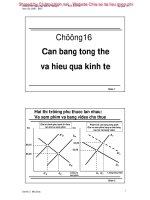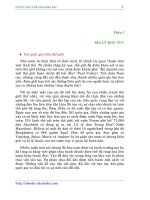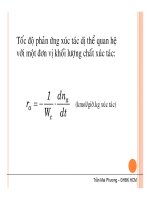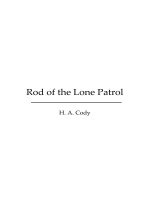The lone ranch
Bạn đang xem bản rút gọn của tài liệu. Xem và tải ngay bản đầy đủ của tài liệu tại đây (1.35 MB, 350 trang )
TheProjectGutenbergEBookofTheLoneRanche,byCaptainMayneReid
ThiseBookisfortheuseofanyoneanywhereatnocostandwith
almostnorestrictionswhatsoever.Youmaycopyit,giveitawayor
re-useitunderthetermsoftheProjectGutenbergLicenseincluded
withthiseBookoronlineatwww.gutenberg.org
Title:TheLoneRanche
Author:CaptainMayneReid
ReleaseDate:April27,2007[EBook#21240]
Language:English
***STARTOFTHISPROJECTGUTENBERGEBOOKTHELONERANCHE***
ProducedbyNickHodsonofLondon,England
CaptainMayneReid
"TheLoneRanche"
ChapterOne.
ATaleoftheStakedPlain.
“HatsOff!”
Within the city of Chihuahua, metropolis of the northern provinces of
Mexico—for the most part built of mud—standing in the midst of vast
barren plains, o’ertopped by bold porphyritic mountains—plains with a
population sparse as their timber—in the old city of Chihuahua lies the
firstsceneofourstory.
Less than twenty thousand people dwell within the walls of this North
Mexican metropolis, and in the country surrounding it a like limited
number.
Oncetheywerethickeronthesoil;butthetomahawkoftheComanche
and the spear of the Apache have thinned off the descendants of the
Conquistadores,untilcountryhousesstandatwidedistancesapart,with
morethananequalnumberofruinsbetween.
Yet this same city of Chihuahua challenges weird and wonderful
memories. At the mention of its name springs up a host of strange
records, the souvenirs of a frontier life altogether different from that
wreathed round the history of Anglo-American borderland. It recalls the
cowled monk with his cross, and the soldier close following with his
sword;theoldmission-house,withitschurchandgarrisonbesideit;the
fierce savage lured from a roving life, and changed into a toiling peon,
afterwardstorevoltagainstasystemofslaverythatevenreligionfailedto
make endurable; the neophyte turning his hand against his priestly
instructor, equally his oppressor; revolt followed by a deluge of blood,
with ruinous devastation, until the walls of both mission and military
cuartelarelefttenantless,andtheredskinhasreturnedtohisroving.
SuchahistoryhashadthecityofChihuahuaandthesettlementsinits
neighbourhood. Nor is the latter portion of it all a chronicle of the olden
time. Much of it belongs to modern days; ay, similar scenes are
transpiring even now. But a few years ago a stranger entering its gates
would have seen nailed overhead, and whisked to and fro by the wind,
some scores of objects similar to one another, and resembling tufts of
hair, long, trailing, and black, as if taken from the manes or tails of
horses. But it came not thence; it was human hair; and the patches of
skin that served to keep the bunches together had been stripped from
humanskulls!Theywerescalps—thescalpsofIndians,showingthatthe
ComancheandApachesavageshadnothaditalltheirownway.
Besidethemcouldbeseenotherelevatedobjectsofauricleshape,setin
rows or circles like a festooning of child peppers strung up for
preservation.Nodoubttheirprocurementhaddrawntearsfromtheeyes
ofthosewhoseheadshadfurnishedthem,fortheywerehumanears!
These ghastly souvenirs were the bounty warrants of a band whose
deeds have been already chronicled by this same pen. They were the
trophiesof“ScalpHunters”—vouchersforthenumberofIndianstheyhad
killed.
Theyweretherelessthanaquarterofacenturyago,wavinginthedry
wind that sweeps over the plains of Chihuahua. For aught the writer
knows, they may be there still; or, if not the same, others of like gory
recordreplacingorsupplementingthem.
Itisnotwiththe“ScalpHunters”wehavenowtodo—onlywiththecityof
Chihuahua. And not much with it either. A single scene occurring in its
streetsisallofChihuahuaenselifetobedepictedinthistale.
It was the spectacle of a religious procession—a thing far from
uncommoninChihuahuaoranyotherMexicantown;onthecontrary,so
commonthatatleastweeklythelikemaybewitnessed.Thiswasoneof
the grandest, representing the story of the Crucifixion. Citizens of all
classesassistedattheceremony,thesoldieryalsotakingpartinit.The
clergy, of course, both secular and regular, were its chief supports and
propagators. To them it brought bread, and if not butter—since there is
noneinChihuahua—itaddedtotheirincomesandinfluence,bythesale
of leaden crosses, images of the Virgin Mother, and the numerous
sisterhoodofsaints.InthefuncionfiguredtheusualScripturecharacters:
—The Redeemer conducted to the place of Passion; the crucifix, borne
on the shoulders of a brawny, brown-skinned Simon; Pilate the
oppressor; Judas the betrayer—in short, every prominent personage
spokenofashavingbeenpresentonthatoccasionwhentheSonofMan
sufferedforoursins.
There is, or was then, an American hotel in Chihuahua, or at least one
conductedintheAmericanfashion,thoughonlyamereposada.Among
its guests was a gentleman, stranger to the town, as the country. His
dressandgeneralappearancebespokehimfromtheStates,andbythe
sametokensitcouldbetoldthathebelongedtotheirsouthernsection.
HewasintruthaKentuckian;butsofarfromrepresentingthetype,tall,
rough,andstalwart,usuallyascribedtothepeople“Kaintuck,”hewasa
man of medium size, with a build comparable to that of the Belvidere
Apollo. He had a figure tersely set, with limbs well knitted; a handsome
face and features of amiable cast, at the same time expressing
confidenceandcourage.AcostlyGuayaquilhatuponhishead,andcoat
to correspond, bespoke him respectable; his tout ensemble proclaimed
himamanofleisure;whilehisairandbearingwereunmistakablysuch
ascouldonlybelongtoaborngentleman.
WhyhewasinChihuahua,orwhencehehadcometoit,nooneseemed
toknoworcare.Enoughthathewasthere,andgazingatthespectacular
processionasitfiledpasttheposada.
Hewasregardingitwithnoeyeofwonderment.Inalllikelihoodhehad
seensuchbefore.HecouldnothavetravelledfarthroughMexicowithout
witnessingsomeceremonyofasimilarkind.
Whetherinterestedinthisoneornohewassoonnotifiedthathewasnot
regardingitinthemannerproperorcustomarytothecountry.Standing
half behind one of the pillars of the hotel porch, he had not thought it
necessary to take off his hat. Perhaps placed in a more conspicuous
position he would have done this. Frank Hamersley—for such was his
name—was not the sort of man to seek notoriety by an exhibition of
bravado,and,beingaProtestantofamostliberalcreed,hewouldhave
shrunkfromoffendingtheslightestsensibilitiesofthosebelongingtoan
opposite faith—even the most bigoted Roman Catholic of that most
bigotedland.Thathis“Guayaquil”stillremaineduponhisheadwasdue
to simple forgetfulness of its being there; it had not occurred to him to
uncover.
While silently standing with eyes turned towards the procession, he
observed scowling looks, and heard low growlings from the crowd as it
swayedslowlypast.Heknewenoughtobeconsciousofwhatthismeant;
buthefeltatthesametimedisinclinedtohumiliatehimselfbyatoofacile
compliance.AproudAmerican,inthemidstofapeoplehehadlearnedto
despise—their idolatrous observances along with them—no wonder he
shouldfeelalittledefiantandagooddealexasperated.Enoughyielding,
hethought,towithdrawfartherbackfrombehindthepillar,whichhedid.
Itwastoolate.Thekeeneyeofafanatichadbeenuponhim—onewho
appeared to have authority for meting out chastisement. An officer,
beardedandgrandlybedizened,ridingattheheadofatroopoflancers,
quicklywheeledhishorsefromoutofthelineofmarch,andspurredhim
towardstheporchoftheposada.Inanotherinstanthisbaredbladewas
wavingoverthehattedheadoftheKentuckian.
“Gringo! alto su sombrero! Abajo! a sus rodillas!” (“Off with your hat,
greenhorn! Down upon your knees!”) were the words that came hissing
fromthemoustachedlipsofthelancer.
Astheyfailedtobegetcompliance,theywereinstantlyfollowedbyablow
from the blade of his sabre. It was given sideways, but with sufficient
sleightandforcetosendtheGuayaquilhatwhirlingoverthepavement,
anditswearerreelingagainstthewall.
Itwasbutthestaggerofasuddenandunexpectedsurprise.Inanother
instant the “gringo” had drawn a revolving pistol, and in yet another its
bullet would have been through the brain of the swaggering aggressor,
but for a third personage, who, rushing from behind, laid hold of the
Kentuckian’sarm,andrestrainedthefiring.
At first it seemed to Hamersley the act of another enemy; but in a
momentheknewittobethebehaviourofafriend—atleastapacificator
bentuponseeingfairplay.
“You are wrong, Captain Uraga,” interposed he who had intermeddled,
addressing himself to the officer. “This gentleman is a stranger in the
country,andnotacquaintedwithourcustoms.”
“Then it is time the heretico should be taught them, and, at the same
time,respectfortheHolyChurch.Butwhatright,ColonelMiranda,have
youtointerfere?”
“Theright,firstofhumanity,secondofhospitality,andthirdthatIamyour
superiorofficer.”
“Bah! You mistake yourself. Remember, señor coronel, you are not in
yourowndistrict.IfitwasinAlbuquerque,Imighttakecommandsfrom
you.ThisisthecityofChihuahua.”
“Chihuahuaornot,youshallbemadeanswerableforthisoutrage.Don’t
imagine that your patron, Santa Anna, is now Dictator, with power to
endorsesuchbaseconductasyours.Youseemtoforget,CaptainUraga,
that you carry your commission under a new regime—one that holds
itself responsible, not only to fixed laws, but to the code of decency—
responsiblealsoforinternationalcourtesytothegreatRepublicofwhich,
Ibelieve,thisgentlemanisacitizen.”
“Bah!”oncemoreexclaimedthebedizenedbully.“Preachyourpalabras
toearsthathavetimetolistentothem.Ishan’tstoptheprocessionfor
eitheryouoryourYankeeprotégé.Soyoucanbothgotothedevil.”
With this benevolent permission the captain of lancers struck the spurs
into his horse, and once more placed himself at the head of his troop.
The crowd collected by the exciting episode soon scattered away—the
sooner that the strange gentleman, along with his generous defender,
haddisappearedfromtheportico,havinggoneinsidetheinn.
Theprocessionwasstillpassing,anditsirresistibleattractionssweptthe
loiterers along in its current—most of them soon forgetting a scene
which, in that land, where “law secures not life,” is of too frequent
occurrencetobeeithermuchthoughtoforforlongremembered.
ChapterTwo.
AFriendinNeed.
The young Kentuckian was half frenzied by the insult he had received.
Theproudbloodofhisrepublicancitizenshipwasboilingwithinhisveins.
Whatwashetodo?
In the agony of his dilemma he put the question to the gentleman who,
beyondalldoubt,hadrestrainedhimfromcommittingmanslaughter.
Thelatterwasanentirestrangertohim—neverseenhimbefore.Hewas
amanoflessthanthirtyyearsofage,wearingabroad-brimmedhatupon
his head, a cloth jacket, slashed calzoneras, and a red crape scarf
around his waist—in short, the ranchero costume of the country. Still,
there was a military bearing about him that corresponded to the title by
whichthelancercaptainhadaddressedhim.
“Caballero,”hesaidinreply,“ifyourownsafetybeofanyconsequence
to you I should advise you to take no further notice of the incident that
hasarisen,howevermuchitmayhaveexasperatedyou,asnodoubtit
hasdone.”
“Pardonme,señor;butnotforalltheworldwouldIfollowyouradvice—
notformylife.IamanAmerican—aKentuckian.Wedonottakeblows
withoutgivingsomethingofthesameinreturn.Imusthaveredress.”
“IfyouseekitbythelawImayaswellwarnyou,youwon’thavemuch
chanceoffindingit.”
“Iknowthat.Thelaw!Ididnotthinkofsuchathing.Iamagentleman;I
suppose this Captain Uraga supposes himself to be the same, and will
notrefusetogivemetheusualsatisfaction.”
“Hemayrefuse,andverylikelywill,onthepleaofyourbeingastranger
—onlyabarbarian,aTejanoorgringo,ashehasputit.”
“Iamalonehere—whatamItodo?”
The Kentuckian spoke half in soliloquy, his countenance expressing
extremechagrin.
“Fuez,señor!”respondedtheMexicancolonel,“ifyou’redeterminedona
desafio I think I might arrange it. I feel that I am myself a little
compromised by my interference; and if you’ll accept of me for your
second,IthinkIcananswerforitthatCaptainUragawillnotdaretodeny
us.”
“Colonel Miranda—your name, I believe—need I attempt to express my
thanksforsomuchgenerosity?Icannot—Icouldnot.Youhaveremoved
theverydifficultythatwasinmyway;forIamnotonlyastrangertoyou,
buttoeveryonearound.IarrivedatChihuahuabutyesterday,anddonot
knowasoulintheplace.”
“Enough; you shall not be disappointed in your duel for the want of a
second. As a preliminary, may I ask if you are skilled in the use of the
sword?”
“Sufficientlytostakemylifeuponit.”
“I put the question, because that is the weapon your adversary will be
certaintochoose.Youbeingthechallenger,ofcoursehehasthechoice;
andhewillinsistuponit,forareasonthatmayperhapsamuseyou.Itis
thatweMexicangentlemenbelieveyouAmericanssomewhatgauchein
thehandlingoftherapier,thoughweknowyoutobeadeptsintheuseof
thepistol.ItakeCaptainGilUragatobeasthoroughapoltroonasever
wore epaulettes, but he will have to meet you on my account; and he
wouldperhapshavedonesoanyhow—trustingtotheprobabilityofyour
beingabadswordsman.”
“Inthathemayfindhimselfdisappointed.”
“Iamgladtohearit;andnowitonlyneedstoreceiveyourinstructions.I
amreadytoact.”
The instructions were given, and within two hours’ time Captain Gil
Uraga,oftheZacatecasLancers,wasinreceiptofachallengefromthe
Kentuckian—ColonelMirandabeingitsbearer.
With such a voucher the lancer officer could not do otherwise than
accept,whichhedidwithcoolerconfidencefortheveryreasonMiranda
hadmadeknown.ATejano,washisreflection—whatshouldheknowof
thesword?
Andswordsweretheweaponschosen.
Had the captain of Zacatecas Lancers been told that his intended
adversary had spent a portion of his life among the Creoles of New
Orleans,hewouldhavebeenlessreliantonthechanceslikelytoturnup
inhisfavour.
Weneednotdescribetheduel,which,ifdifferentfromotherencounters
of the kind, was by being on both sides bitter, and of deadly intent.
Suffice it to say, that the young Kentuckian displayed a skill in
swordsmanshipsufficienttodisarrangeseveralofGilUraga’sfrontteeth,
andmakeanuglygashinhischeek.Hehadbarelylefttohimsufficient
commandofhismouthtocry“Basta!”andsotheaffairended.
“SeñorHamersley,”saidthemanwhohadsoeffectivelybefriendedhim,
aftertheyhadreturnedfromtheencounter,andweredrinkingabottleof
Pasowineintheposada,“mayIaskwhereyouintendgoingwhenyou
leaveChihuahua?”
“ToSantaFé,inNewMexico;thencetotheUnitedStates,alongwithone
ofthereturncaravans.”
“Whendoyouproposestarting?”
“Astothat,Iamnottiedtotime.ThetrainwithwhichIamtocrossthe
plainswillnotbegoingforsixmonthstocome.IcangettoSantaFébya
month’stravel,Isuppose?”
“Lessthanthat.Itisnotaquestionofhowsoonyoumayarrivethere,but
whenyouleavehere.Iadviseyoutostartatonce.Iadmitthattwodays
is but a short time to see the sights of even so small a place as
Chihuahua.Butyouhavewitnessedoneofthem—enough,Ishouldsay.
Ifyoutakemyadviceyouwillletitcontentyou,andkicktheChihuahuaensedustfromyourfeetbeforeanothertwenty-fourhourshavepassed
overyourhead.”
“Butwhy,ColonelMiranda?”
“Becausesolongasyouremainhereyouwillbeindangeroflosingyour
life. You don’t know the character of the man with whom you have
crossed swords. I do. Although wearing the uniform of an officer in our
army, he is simply a salteador. A coward, as I told you, too. He would
neverhavemetyouifhehadthoughtIwouldhavegivenhimachanceto
get out of it. Perhaps he might have been tempted by the hopes of an
easyconquestfromyoursupposedwantofskill.Itwouldhavegivenhim
something to boast about among the dames of Chihuahua, for Captain
Gil deems himself no little of a lady-killer. You have spoilt his
physiognomy for life; and, depend upon it, as long as life lasts, he will
neitherforgetnorforgivethat.Ishallalsocomeinforashareofhisspite,
anditbehovesbothofustobewareofhim.”
“Butwhatcanhedotous?”
“Caballero, that question shows you have not been very long in this
country, and are yet ignorant of its customs. In Mexico we have some
callings not congenial to your people. Know that stilettoes can here be
purchased cheaply, with the arms of assassins to use them. Do you
understandme?”
“Ido.Buthowdoyoucounselmetoact?”
“AsIintendactingmyself—takedeparturefromChihuahuathisveryday.
OurroadsarethesameasfarasAlbuquerque,whereyouwillbeoutof
reach of this little danger. I am returning thither from the city of Mexico,
where I’ve had business with the Government. I have an escort; and if
youchoosetoavailyourselfofityou’llbewelcometoitsprotection.”
“Colonel Miranda, again I know not how to thank you. I accept your
friendlyoffer.”
“Reserve your thanks till I have done you some service beyond the
simple duty of a gentleman, who sees another gentleman in a dilemma
hehadnohandincreating.Butenough,señor;wehavenotimetospend
intalking.Evennowtheremaybeacoupleofpoignardspreparingforus.
Getyourthingsreadyatonce,asIstarttwohoursbeforesunset.Inthis
sultryweatherweareaccustomedtotravelinthecooloftheevening.”
“Ishallbeready.”
That same afternoon, two hours before the going down of the sun, a
partyofhorsemen,wearingtheuniformofMexicandragoonsoftheline,
issuedfromthegaritaofChihuahua,andtookthenorthernroadleading
toSantaFé,byElPasodelNorte.ColonelMiranda,hisrancherodress
changedforthefatigueuniformofacavalryofficer,wasatitshead,and
byhissidethestranger,whosecausehehadsogenerouslyandgallantly
espoused.
ChapterThree.
TheColonelCommandant.
Six weeks have elapsed since the day of the duel at Chihuahua. Two
men are standing on the azotea of a large mansion-like house close to
the town of Albuquerque, whose church spire is just visible through the
foliageoftreesthatshadeandsurroundthedwelling.TheyareColonel
Miranda and the young Kentuckian, who has been for some time his
guest;forthehospitalityofthegenerousMexicanhadnotterminatedwith
the journey from Chihuahua. After three weeks of toilsome travel,
including the traverse of the famed “Dead Man’s Journey,” he was
continuingtoextenditinhisownhouseandhisowndistrict,ofwhichlast
hewasthemilitarycommandant,Albuquerquebeingatthetimeoccupied
byabodyoftroops,stationedtherefordefenceagainstIndianincursions.
ThehouseonwhoseroofthetwomenstoodwasthatinwhichColonel
Miranda had been born—the patrimonial mansion of a large estate that
extended along the Rio del Norte, and back towards the Sierra Blanca,
intoterritoriesalmostunknown.
BesidesbeinganofficerintheMexicanarmy,thecolonelwasoneofthe
ricos of the country. The house, as already said, was a large, massive
structure,having,likeallMexicandwellingsofitsclass,aterracedroof,
or azotea. What is also common enough in that country, it was
surmountedbyamirador,or“belvedere.”Standinglessthanhalfamile
distantfromthesoldier’scuartel,thecommandantfounditconvenientto
make use of it as his headquarters. A small guard in the saguan, or
covered entrance below, with a sentinel stationed outside the gate in
front,indicatedthis.
Therewasnofamilyinside,wife,woman,orchild;forthecolonel,stilla
young man, was a bachelor. Only peons in the field, grooms and other
servants around the stables, with domestics in the dwelling—all, male
andfemale,beingIndiansoftheraceknownas“Indiosmansos”—brownskinnedandobedient.
Butthoughatthistimetherewasnolivingladytomakehersoftfootsteps
heard within the walls of the commandant’s dwelling, the portrait of a
lovely girl hung against the side of the main sola, and on this his
American guest had more than once gazed in silent admiration. It
showed signs of having been recently painted, which was not strange,
sinceitwasthelikenessofColonelMiranda’ssister,afewyearsyounger
thanhimself—atthetimeonavisittosomerelativesinadistantpartof
the Republic. Frank Hamersley’s eyes never rested on it without his
wishingtheoriginalathome.
The two gentlemen upon the housetop were leisuring away the time in
theindulgenceofacigar,watchingthewater-fowlthatswamandplunged
on the bosom of the broad shallow stream, listening to the hoarse
croakingsofpelicansandtheshrillerscreamsoftheguayacranes.Itwas
thehourofevening,whenthesebirdsbecomeespeciallystridulent.
“Andsoyoumustgoto-morrow,SeñorFrancisco?”saidhishost,taking
thecigarittofrombetweenhisteeth,andlookinginquiringlyintotheface
oftheKentuckian.
“Thereisnohelpforit,colonel.ThecaravanwithwhichIcameoutwillbe
leavingSantaFéthedayafterto-morrow,andthere’sjusttimeformeto
getthere.UnlessIgoalongwithit,theremaybenootheropportunityfor
monthstocome,andonecannotcrosstheplainsalone.”
“Well,IsupposeImustloseyou.Iamsorry,andselfishly,too,for,asyou
see,Iamsomewhatlonelyhere.There’snotoneofmyofficers,withthe
exception of our old medico, exactly of the sort to be companionable.
True, I have enough occupation, as you may have by this time
discovered, in looking after our neighbours, the Indios bravos, who,
knowing the skeleton of a regiment I’ve got, are growing saucier every
day.IonlywishIhadascoreortwoofyourstalwarttrappers,whonow
and then pay a visit to Albuquerque. Well, my sister will soon be here,
and she, brave girl, has plenty of life in her, though she be but young.
What a joyous creature she is, wild as a mustang filly fresh caught. I
wish,DonFrancisco,youcouldhavestayedtomakeheracquaintance.I
amsureyouwouldbedelightedwithher.”
If the portrait on the wall was anything of a faithful likeness, Hamersley
could not have been otherwise. This was his reflection, though, for
certainreasons,hedidnotinspeechdeclareit.
“It is to be hoped we shall meet again, Colonel Miranda,” was his
ingeniousrejoinder.“IfIdidnothavethishope,Ishouldnowbeparting
fromyouwithgreaterregret.Indeed,Ihavemorethanapresentimentwe
shallmeetagain;sinceI’vemadeupmymindonacertainthing.”
“Onwhat,DonFrancisco?”
“OnreturningtoNewMexico.”
“Tosettleinthecountry?”
“Notexactlythat;onlyforatime—longenoughtoenablemetodispose
of a cargo of merchandise in exchange for a bag of your big Mexican
dollars.”
“Ah!youintendtobecomeoneoftheprairiemerchants,then?”
“Ido.Thatintentionhasbeenthecauseofmyvisitingyourcountry.Iam
oldenoughtothinkofsomecalling,andhavealwayshadafancyforthe
adventurouslifeoftheprairietrader.AsIhavesufficientmeanstostocka
smallcaravanformyself,Ithinknowoftryingit.Mypresenttriphasbeen
merelyoneofexperimentandexploration.Iamsatisfiedwiththeresult,
and,ifnoaccidentarise,youmayseemebackontheDelNortebefore
eitherofusbetwelvemonthsolder.”
“Then,indeed,isthereahopeofourmeetingagain.Iamrejoicedatit.
But, Señor Don Francisco,” continued his host, changing to a serious
tone,“awordlestImightforgetit—awordofcounsel,orwarning,Imay
call it. I have observed that you are too unsuspicious, too regardless of
danger. It does not all lie upon the prairies, or among red-skinned
savages. There is as much of it here, amid the abodes of our so-called
civilisation. When you are travelling through this country bear your late
antagonist in mind, and should you at any time meet, beware of him. I
havegivenyousomehintsaboutthecharacterofGilUraga.Ihavenot
toldyouall.Heisworsethanyoucanevenimagine.Iknowhimwell.Do
youseethatlittlehouse,outyonderontheothersideoftheriver?”
Hamersleynoddedassent.
“Inthathovelhewasborn.Hisfatherwaswhatwecallapelado—apoor
devil, with scarce a coat to his back. Himself the same, but something
worse.Hehasleftinhisnativeplacearecordofcrimeswellknown,with
othersmorethansuspected.Inshort,heis,asIhavetoldyou,arobber.
Nodoubtyouwonderthatsuchamanshouldbeanofficerinourarmy.
Thatisbecauseyouareignorantofthestateofourservice—oursociety
aswell.Itisbuttheresultofconstantlyrecurringchangesinourpolitical
system. Still you may feel surprise at his holding this commission, with
the patriotic party—the pure one—in power, as it now is. That might be
inexplicable even to myself, since I know that he will be traitor to our
causewhenconvenienttohim.ButIalsoknowtheexplanation.Thereis
a power, even when the party exercising it is not in the ascendant—an
influence that works by sap and secrecy. It is that of our hierarchy. Gil
Uraga is one of its tools, since it exactly suits his low instincts and
treacherous training. Whenever the day is ripe for a fresh
pronunciamentoagainstourliberties—ifwearesounfortunateastohave
one—hewillbeamongsttheforemostofthetraitors.Carrai!Icanthinkof
himonlywithdisgustandloathing.Wouldyoubelieveit,señor,thatthis
fellow,nowthatepauletteshavebeensetonhisshoulders—placedthere
for some vile service—has the audacity to aspire to the hand of my
sister?AdelaMirandastandinginbridalrobesbythesideofGilUraga!I
wouldratherseeherinhershroud!”
Hamersley’sbosomheavedupashelistenedtothelastwords,andwith
emotion almost equalling that which excited his host. He had just been
thinking about the portrait upon the wall, and how beautiful the original
must be. Now hearing her name coupled with that of the ruffian whose
blowhehadfelt,andwhosebloodhehadspilled,healmostregrettednot
havingendedthatduelbykillinghisadversaryoutright.
“But surely, Colonel Miranda,” he said at length, “there could be no
dangerofsuchaneventasthatyouspeakof?”
“Never,solongasIlive.But,amigo,asyouhavelearnt,thisisastrange
land—acountryofquickchanges.Iamhereto-day,commandinginthis
district,withpower,Imayalmostsay,overthelivesofallaroundme.TomorrowImaybeafugitive,ordead.Ifthelatter,whereisshe,mypoor
sister,goingtofindthearmthatcouldprotecther?”
AgainthebreastofHamersleyheavedinaconvulsivemanner.Strange
as it might appear, the words of his newly-made friend seemed like an
appealtohim.Anditisjustpossiblesomesuchthoughtwasinthemind
oftheMexicancolonel.Inthestrongmanbyhissidehesawthetypeofa
racewhocanprotect;justsuchanoakashewouldwishtoseehissister
extendherarmstendril-likearound,andclingontoforlife.
Hamersley could not help having vague and varied misgivings; yet
among them was one purpose he had already spoken of—a
determinationtoreturntoAlbuquerque.
“I am sure to be back here,” he said, as if the promise was meant to
tranquillise the apprehensions of the colonel. Then, changing to a more
carelesstone,headded,—
“Icannotcomebythespringcaravans;therewouldnotbetimeenough
to make my arrangements. But there is a more southern route, lately
discovered,thatcanbetravelledatanyseason.PerhapsImaytrythat.
Inanycase,IshallwriteyoubythetrainsleavingtheStatesinthespring,
sothatyoumayknowwhentoexpectme.Andif,ColonelMiranda,”he
added,afterashortreflectivepause,inwhichhiscountenanceassumed
anewandgraverformofexpression,“ifanypoliticaltrouble,suchasyou
speakof,shouldoccur,andyoumayfinditnecessarytofleefromyour
own land, I need not tell you that in mine you will find a friend and a
home. After what has happened here, you may depend upon the first
beingtrue,andthesecondhospitable,howeverhumble.”
On that subject there was no further exchange of speech. The two
individuals,sooddlyasaccidentallyintroduced,flungasidethestumpsof
their cigars; and, clasping hands, stood regarding one another with the
gazeofasincere,unspeakablefriendship.
NextmorningsawtheKentuckianridingawayfromAlbuquerquetowards
the capital of New Mexico, an escort of dragoons accompanying him,
sentbytheMexicancolonelasaprotectionagainstmaraudingIndians.
But all along the road, and for months after, he was haunted with the
memory of that sweet face seen upon the sola wall; and instead of
laughingathimselfforhavingfalleninlovewithaportrait,hebutlonged
toreturn,andlookuponitsoriginal—chafingunderanapprehension,with
which the parting words of his New Mexican host had painfully inspired
him.
ChapterFour.
APronunciamento.
AlittlelessthanaquarterofacenturyagotheNavajoIndianswerethe
terror of the New Mexican settlements. It was no uncommon thing for
them to charge into the streets of a town, shoot down or spear the
citizens,plundertheshops,andseizeuponsuchwomenastheywanted,
carryingthesecaptivestotheirfar-offfastnessesinthelandofNavajoa.
InthecanondeChelleythesesavageshadtheirheadquarters,withthe
temple and estufa, where the sacred fire of Moctezuma was never
permittedtogoout;andthere,intimespast,whenMexicowasmisruled
bythetyrantSantaAnna,mighthavebeenseenscoresofwhitewomen,
captivestotheNavajonation,womenwellbornandtenderlybroughtup,
torn from their homes on the Rio del Norte, and forced to become the
wivesoftheirred-skinnedcaptors—oftenertheirconcubinesandslaves.
White children, too, in like manner, growing up among the children of
their despoilers; on reaching manhood to forget all the ties of kindred,
withtheliensofcivilisedlife—inshort,tobeasmuchsavagesasthose
whohadadoptedthem.
Atnoperiodwasthisdespoliationmorerifethaninthetimeofwhichwe
write.Ithadreacheditsclimaxofhorrors,dayafterdayrecurring,when
Colonel Miranda became military commandant of the district of
Albuquerque; until not only this town, but Santa Fé, the capital of the
provinceitself,wasmenacedwithdestructionbytheredmarauders.Not
alonetheNavajoesonthewest,buttheApachesonthesouth,andthe
Comanches who peopled the plains to the east, made intermittent and
frequentforaysuponthetownsandvillageslyingalongtherenownedRio
del Norte. There were no longer any outlying settlements or isolated
plantations.Thegrandhaciendas,asthehumbleranchos,werealikelain
in ruins. In the walled town alone was there safety for the white
inhabitants of Nuevo Mexico, or for those Indians, termed mansos,
converted to Christianity, and leagued with them in the pursuits of
civilisation. And, indeed, not much safety either within towns—even in
Albuquerqueitself.
Imbued with a spirit of patriotism, Colonel Miranda, in taking charge of
thedistrict—hisnativeplace,asalreadyknown—determinedondoinghis
best to protect it from further spoliation; and for this purpose had
appealedtothecentralgovernmenttogivehimanincreasetotheforces
underhiscommand.
It came in the shape of a squadron of lancers from Chihuahua, whose
garrison only spared them on their being replaced by a troop of like
strength,sentonfromthecapitalofthecountry.
It was not very pleasant to the commandant of Albuquerque to see
CaptainGilUragaincommandofthesubsidythusgrantedhim.Butthe
lancer officer met him in a friendly manner, professing cordiality,
apparently forgetful of their duelling feud, and, at least outwardly,
showingthesubmissionduetothedifferenceoftheirrank.
EngagedinfrequentaffairswiththeIndians,andexpeditionsinpursuitof
them,forawhilethingsseemedtogosmoothlyenough.
ButasAdelaMirandahadnowreturnedhome,andwasresidingwithher
brother, in the interludes of tranquillity he could not help having some
concern for her. He was well aware of Uraga’s aspirations; and, though
loathing the very sight of the man, he was, nevertheless, compelled to
tolerate his companionship to a certain extent, and could not well deny
himtheentréeofhishouse.
At first the subordinate bore himself with becoming meekness. Mock
humility it was, and soon so proved itself. For, as the days passed,
rumours reached the distant department of New Mexico that the old
tyrant Santa Anna was again returning to power. And, in proportion as
thesegainedstrength,soincreasedGilUraga’sconfidenceinhimself,till
atlengthheassumedanairofeffrontery—almostinsolence—towardshis
superiorofficer;andtowardsthesister,intheinterviewshewaspermitted
withher,amannersignificantlycorresponding.
Thesewerefew,andstilllessfrequent,ashisbrusquebehaviourbegan
to manifest itself. Observing it, Colonel Miranda at length came to the
determination that the lancer captain should no longer enter into his
house—atleast,byinvitation.Anyfuturerelationsbetweenthemmustbe
inthestrictexecutionoftheirrespectivemilitaryduties.
“Yes,sister,”hesaid,oneafternoon,asAdelawasbucklingonhisswordbelt,andhelpingtoequiphimfortheeveningparade,“Uragamustcome
here no more. I well understand the cause of his contumacious
behaviour. The priest party is again getting the ascendency. If they
succeed,heavenhelppoorMexico.And,Imayadd,heavenhelpus!”
Drawingthegirltohisbosomwithafondaffectionateembrace,hegave
herabrother’skiss.Then,stridingforth,hespranguponasaddledhorse
held in waiting, and rode off to parade his troops on the plaza of
Albuquerque.
Atenminutes’trotbroughthimintotheirpresence.Theywerenotdrawn
up in line, or other formation, to receive him. On the contrary, as he
approached the cuartel, he saw strange sights, and heard sounds
corresponding.Everythingwasinconfusion—soldiersrushingtoandfro,
utteringseditiouscries.Amongthesewere“VivaSantaAnna!”
“VivaelGeneralArmijo!”
“VivaelCoronelUraga!”
Beyond doubt it was a pronunciamento. The old regime under which
ColonelMirandaheldauthoritywaspassingaway,andanewoneabout
tobeinitiated.
Drawinghisswordandputtingspurtohishorse,hedashedinamongthe
disaffectedmen.
Afewofthefaithfulranup,andrangedthemselvesbyhisside.
Thencommencedastruggle,withshouting,shooting,sabring,andlancethrusts. Several fell—some dead, some only disabled; among the last,
ColonelMirandahimself,gravelywounded.
Intenminutesitwasallover;andthecommandantofAlbuquerque,no
longercommanding,laylodgedinthegarrisoncarcel;CaptainGilUraga,
nowcolonel,replacinghimasthesuprememilitaryofficerofthedistrict.
WhileallaroundrantherumourthatDonAntonioLopesdeSantaAnna
was once more master of Mexico; his satellite, Manuel Armijo, again
GovernorofSantaFé.
ChapterFive.
“Whycomeshenot?”
“WhatdelaysValerian?Whatcanbekeepinghim?”
ThesequestionscamefromAdelaMiranda,ontheeveningofthatsame
day,standinginthedoorofherbrother’shouse,witheyesbentalongthe
roadleadingtoAlbuquerque.Valerianwasherbrother’sbaptismalname,
anditwasabouthisabsenceshewasanxious.
Forthisshehadreasons—morethanone.Thoughstillonlyayounggirl,
shequiteunderstoodthepoliticalsituationoftheMexicanRepublic;atall
timesshifting,oflatemorecriticalthanusual.Inherbrother’sconfidence,
shehadbeenkeptpostedupinallthattranspiredinthecapital,asalso
thedistrictoverwhichheheldmilitarycommand,andknewthedangerof
which he was himself apprehensive—every day drawing nigher and
nigher.
Shortlyafterhisleavinghershehadheardshots,withadistantmurmur
ofvoices,inthedirectionofthetown.Fromtheazolea,towhichshehad
ascended,shecouldnotethesenoisesmoredistinctly,butfanciedthem
tobesalutes,vivas,andcheers.Still,therewasnothingmuchinthat.It
mightbesomejubilationofthesoldieryattheordinaryeveningparade;
and,rememberingthatthedaywasafiesta,shethoughtlessofit.
But,asnightdrewdown,andherbrotherhadnotreturned,shebeganto
feelsomeslightapprehension.Hehadpromisedtobebackforadinner
that was long since due—a repast she had herself prepared, more
sumptuousthancommononaccountofthesaint’sday.Thiswasitthat
elicitedtheanxiousself-askedinterrogatories.
After giving utterance to them, she paced backward and forward; now
standing in the portal and gazing along the road; now returning to the
sola de comida, to look upon the table, with cloth spread, wines
decantered, fruits and flowers on the épergne—all but the dishes that
waitedservingtillValerianshouldshowhimself.
To look on something besides—a portrait that hung upon the wall,
underneathherown.Itwasasmallthing—amerephotographiccarte-devisite. But it was the likeness of one who had a large place in her
brother’s heart, if not in her own. In hers, how could it? It was the
photographofamanshehadneverseen—FrankHamersley.Hehadleft
it with Colonel Miranda, as a souvenir of their short but friendly
intercourse.
DidColonelMiranda’ssisterregarditinthatlight?Shecouldnotinany
other.Still,asshegazeduponit,athoughtwaspassingthroughhermind
somewhat different from a sentiment of simple friendship. Her brother
had told her all—the circumstances that led to his acquaintance with
Hamersley; of the duel, and in what a knightly manner the Kentuckian
had carried himself; adding his own commentaries in a very flattering
fashion.This,ofitself,hadbeenenoughtopiquecuriosityinayounggirl,
just escaped from her convent school; but added to the outward
semblance of the stranger, by the sun made lustrous—so lustrous
inwardly—Adela Miranda was moved by something more than curiosity.
As she stood regarding the likeness of Frank Hamersley she felt very
much as he had done looking at hers—in love with one only known by
portraitandrepute.
Insuchthereisnothingstrangenornew.Manyareaderofthistalecould
speakofasimilarexperience.
While gazing on the carte-de-visite she was roused from the sweet
reverieithadcalledupbyhearingfootstepsoutside.Someonecomingin
throughthesaggan.
“Valerianatlast!”
Thestepssoundedasifthemanmakingthemwereinahurry.Soshould
herbrotherbe,havingsolongdelayedhisreturn.
Sheglidedouttomeethimwithaninterrogatoryonherlips.
“Valerian?”—thissuddenlychangingtotheexclamation,“MadredeDios!
’Tisnotmybrother!”
Itwasnot,butamanpaleandbreathless—apeonoftheestablishment
—who,onseeingher,gaspedout,—
“Señorita! I bring sad news. There’s been a mutiny at the cuartel—a
pronunciamento.Therebelshavehaditalltheirownway,andIamsorry
totellyouthatthecolonel,yourbrother—”
“Whatofhim?Speak!Ishe—”
“Notkilled,nina;onlywounded,andaprisoner.”
AdelaMirandadidnotswoonnorfaint.Shewasnotofthenervouskind.
Nurtured amid dangers, most of her life accustomed to alarms from
Indianincursions,aswellasrevolutionaryrisings,sheremainedcalm.
Shedispatchedmessengerstothetown,secretly,oneafteranother;and,
while awaiting their reports, knelt before an image of the Virgin, and
prayed.
Up till midnight her couriers went, and came. Then one who was more
thanamessenger—herbrotherhimself!
Asalreadyreportedtoher,hewaswounded,andcameaccompaniedby
the surgeon of the garrison, a friend. They arrived at the house in hot
haste,asifpursued.
Andtheywereso,asshesoonafterlearnt.
TherewasjusttimeforColonelMirandatoselectthemostcherishedof
his penates; pack them on a recua of mules, then mount, and make
away.
They had scarce cleared the premises when the myrmidons of the new
commandant,ledbythemanhimself,rodeupandtookpossessionofthe
place.
Bythistime,andbygoodluck,theruffianwasintoxicated—sodrunkhe
couldscarcecomprehendwhatwaspassingaroundhim.Itseemedlikea
dreamtohimtobetoldthatColonelMirandahadgotclearaway;amore
horridonetohearthatshewhomhedesignedforavictimhadescaped
fromhisclutches.
Whenmorningdawned,andinsoberermoodhelistenedtothereportsof
thosesentinpursuit—alltellingthesametaleofnon-success—heraved
likeoneinafrenzyofmadness.FortheescapeofthelateCommandant
ofAlbuquerquehadrobbedhimoftwothings—tohimthesweetestinlife
—one, revenge on the man he heartily hated; the other, possession of
thewomanhepassionatelyloved.
ChapterSix.
Surrounded.
Aplainofpuresand,glaringred-yellowunderthefirstraysoftherising
sun; towards the east and west apparently illimitable, but interrupted
northwardbyachainoftable-toppedhills,andalongitssouthernedgeby
a continuous cliff, rising wall-like to the height of several hundred feet,
andtrendingeachwaybeyondthevergeofvision.
Abouthalf-distancebetweenthisprolongedescarpmentandtheoutlying
hills six large “Conestoga” waggons, locked tongue and tail together,
enclosing a lozenge-shaped or elliptical space—a corral—inside which
arefifteenmenandfivehorses.
Onlytenofthemenareliving;theotherfivearedead,theirbodieslying
a-stretchbetweenthewheelsofthewaggons.Threeofthehorseshave
succumbedtothesamefate.
Outside are many dead mules; several still attached to the protruding
poles, that have broken as their bodies fell crashing across them.
Fragmentsofleatherstrapsandcastgearingtellofothersthathavetorn
loose,andscouredofffromtheperilousspot.
Inside and all around are traces of a struggle—the ground scored and
furrowed by the hoofs of horses, and the booted feet of men, with here
and there little rivulets and pools of blood. This, fast filtering into the
sand,showsfreshlyspilled—someofitstillsmoking.
All the signs tell of recent conflict. And so should they, since it is still
going on, or only suspended to recommence a new scene of the strife,
whichpromisestobeyetmoreterribleandsanguinarythanthatalready
terminated.
A tragedy easy of explanation. There is no question about why the
waggonshavebeenstopped,orhowthemen,mules,andhorsescame
tobekilled.Distantaboutthreehundredyardsuponthesandyplainare
other men and horses, to the number of near two hundred. Their halfnakedbodiesofbronzecolour,fantasticallymarkedwithdevicesinchalkwhite, charcoal-black, and vermillion red—their buckskin breech-clouts
andleggings,withplumesstickingtuft-likeabovetheircrowns—allthese
insigniashowthemtobeIndians.
It is a predatory band of the red pirates, who have attacked a travelling
partyofwhites—nonewspectacleontheprairies.
Theyhavemadethefirstonslaught,whichwasintendedtostampedethe
caravan,andatoncecaptureit.Thiswasdonebeforedaybreak.Foiled
intheattempt,theyarenowlayingsiegetoit,havingsurroundeditonall
sides at a distance just beyond range of the rifles of those besieged.
Theirlineformsthecircumferenceofacircleofwhichthewaggonclump









